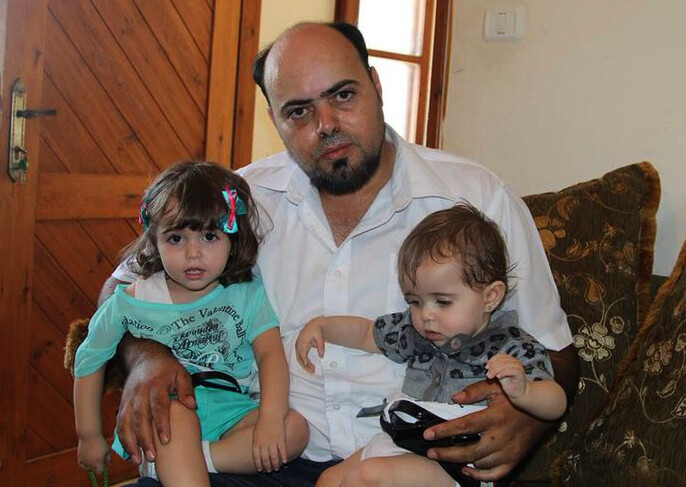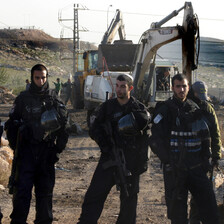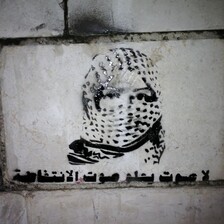The Electronic Intifada Jerusalem 8 May 2014

Amjad Safadi was interrogated for more than fifty days and subjected to torture. (Photo courtesy of the Safadi family)
On the morning of 29 April, Amjad Safadi’s wife left their Jerusalem home for work. A little after 8am, Amjad’s younger brother Samer arrived to escort him to a court hearing. As he opened the door to his room, Samer found that Amjad had hanged himself.
The shocking death of the 39-year-old lawyer and father of two girls came five days after his release from the notorious underground Russian Compound detention center — known in Arabic as the Moskobiyeh — in Jerusalem.
It is believed that Safadi took his life as a result of more than fifty days of harsh interrogation he underwent there.
“He looked very exhausted after the long hours of interrogation and the violent beating,” Amjad’s lawyer Fathi Farhoud told The Electronic Intifada. “I deem what happened to Amjad as an indirect killing by the occupation.”
Amjad Safadi was the second of four brothers and two sisters. “He was a very sensitive person. He was a poet,” said his older brother, Ahmad. He lived in the Assadiyeh Quarter between al-Sahreh Gate in Jerusalem’s Old City and al-Ghawanmeh Gate at the Noble Sanctuary which houses al-Aqsa mosque. This quarter is a place of regular clashes between the Palestinian residents and Israeli occupation forces.
Safadi was arrested on 6 March during a regular visit to HaDarim prison. “He was accused of collaborating with a terrorist organization and meeting a foreign agent,” said Farhoud. Five other lawyers were arrested on the same charges.
“They are trying to intimidate lawyers to make them stop visiting the prisoners,” insisted Farhoud.
“Amjad was a lawyer for several prisoners. Part of his job is to carry letters from prisoners to their families and beloved ones,” said Nasser Qaws, Palestinian Prisoners Club director in Jerusalem.
Safadi and three other lawyers were released on 20,000 NIS ($5,800) bail and sentenced to house arrest. Their licenses to practice law were suspended. Only Shireen Issawi remains in custody.
Shireen, sister of former hunger striker Samer Issawi, spent a year in prison in 2010 for similar charges. She has been suspended from practicing law in Jerusalem ever since.
Deteriorated state
Safadi was locked up in solitary confinement, in a closely-monitored room.
His brother Ahmad, director of the Elia Youth Media Association in Jerusalem, believes that the conditions of his detention contributed to Amjad’s deteriorated mental state.
“They locked him up with criminal inmates rather than the Palestinian security prisoners,” he said, in a reference to Palestinian activists or alleged fighters. “They put him with drug addicts and criminals.”
Amjad Safadi was previously arrested during the first intifada in 1989 when he was only 14 years old. He spent eight months in prison along with his brother Ahmad.
Safadi received his law degree from Al-Quds University in Abu Dis in 2001, and opened an office in Jerusalem that he closed soon after due to financial troubles. “He used to spend most of his time defending poor people for free,” said Ahmad.
According to his brother, Safadi continued taking on the cases of the poor in Jerusalem who suffered from enormous taxes imposed by the Israeli authorities and who risked losing their Jerusalem identity cards.
Israeli authorities continue to impose high taxes on the Palestinian population in Jerusalem, as part of their wider attempt to push them out of the city. Residents who fail to pay their taxes risk losing their National Insurance coverage. This then gives Israeli courts a pretext to revoke their residency status.
“Amjad was interrogated by the Shabak [Israel’s secret police force],” said Farhoud. “We have testimonials [from former Palestinian prisoners who detained with Safadi] that he was subjected to electric shocks on his head and other parts of his body.”
Torture
The Public Committee against Torture in Israel accused the Shabak in 2012 of a lack of accountability — not a single one of 700 complaints of torture or ill-treatment was criminally investigated between 2001 and 2010.
The Palestinian Ministry of Detainees and Ex-Detainees Affairs and the human rights group Al-Haq say that 203 Palestinians have died in Israeli prisons since 1967, 71 of them due to torture.
In 2013, 33-year-old Arafat Jaradat died in Israeli custody after he was subjected to torture. His death was followed by mass protests and clashes between Palestinians and Israeli occupation forces in the West Bank.
“We have witnessed an increase in torture cases lately, especially amongst children,” Nasser Qaws, director of the Palestinian Prisoners Club in Jerusalem, told The Electronic Intifada.
“A latest example is the child Rashid Rishiq, 14 years old from the Old City, who was subjected to electric shocks and violent beatings during the interrogation,” Qaws said. “Two months later, he was released to house arrest after being forced to admit to the accusations.”
Qaws added that during his own brief detention in March after he was arrested during a sit-in protesting Israeli forces’ attacks on worshippers at al-Aqsa mosque, he was told by other prisoners inside that they witnessed Safadi being subjected to electrical shocks.
“After his release, he confirmed that he was subjected to electrical shocks,” said Ahmad Safadi. “They electrocuted him because he refused to appear in front of the court and protested the interrogation conditions.”
Accomplice
Amjad Safadi was a psychiatric patient and took medicines that kept him mentally stable. “Amjad was not allowed to take his meds in prison,” said Ahmad. “They played with his meds and did not give him the appropriate medical attention.
“We demanded that he sees a specialist doctor from the first days [of his detention], but they refused,” he added. “And after the long periods of interrogation and the terrible detention conditions, his health deteriorated. The prison’s doctor claimed that Amjad was just acting.”
“There was big medical negligence,” said Farhoud. “The prison doctor was an accomplice with the interrogators.”
Safadi was not able to see a doctor after he was released because he was sent directly to house arrest. He needed a special court order to be allowed to see a doctor, according to his lawyer.
“We hold the occupation responsible,” said Qaws. “A committee of lawyers met and decided to file a lawsuit against the occupation.”
Ahmad Safadi told The Electronic Intifada that there was no indication that Amjad was planning to take his life, despite his fatigue. As the family is eager to hold those responsible accountable, they remain uncertain as to the reasons for his death.
The Safadi family says that no autopsy was performed on Amjad and that they received no medical report as to the cause of his death. “They took the body away quickly without even lifting prints,” Ahmad said.
“We still have doubts that his suicide was staged,” said Ahmad. “The Shabak have the keys to his house; they could have killed him. It would not have been the first time they attempt to kill one of us. A Shabak agent attempted to kill me in the first intifada, but they failed. We caught the collaborators, and they confessed.”
In 1989, according to Ahmad, two Shabak agents tried to instigate a fight in his neighborhood and were planning to stab him and make it appear accidental. He claimed that they were working with Palestinian collaborators who later confessed to the plot.
Maath Musleh is a Palestinian journalist and blogger based in Jerusalem and a visiting lecturer at Al-Quds Bard Honors College.




